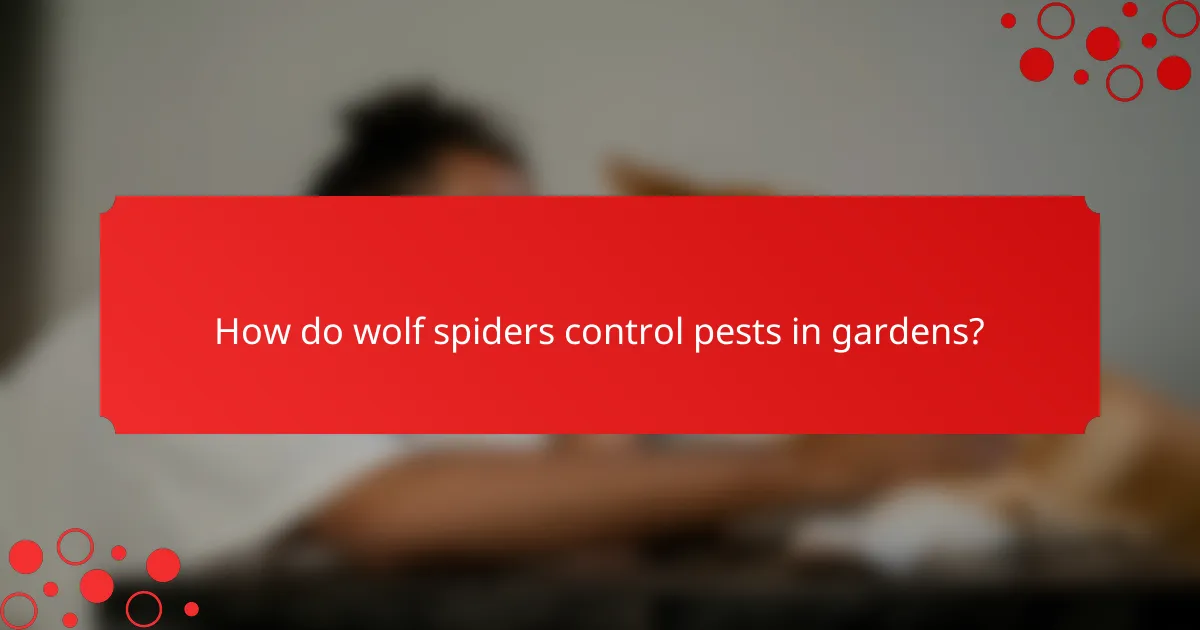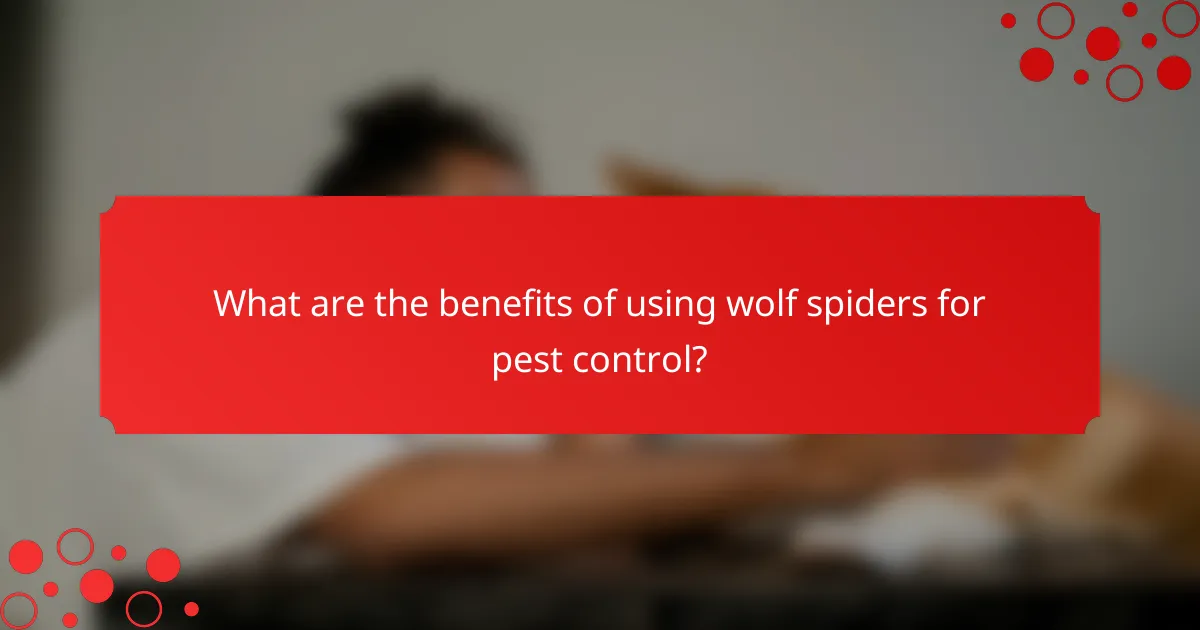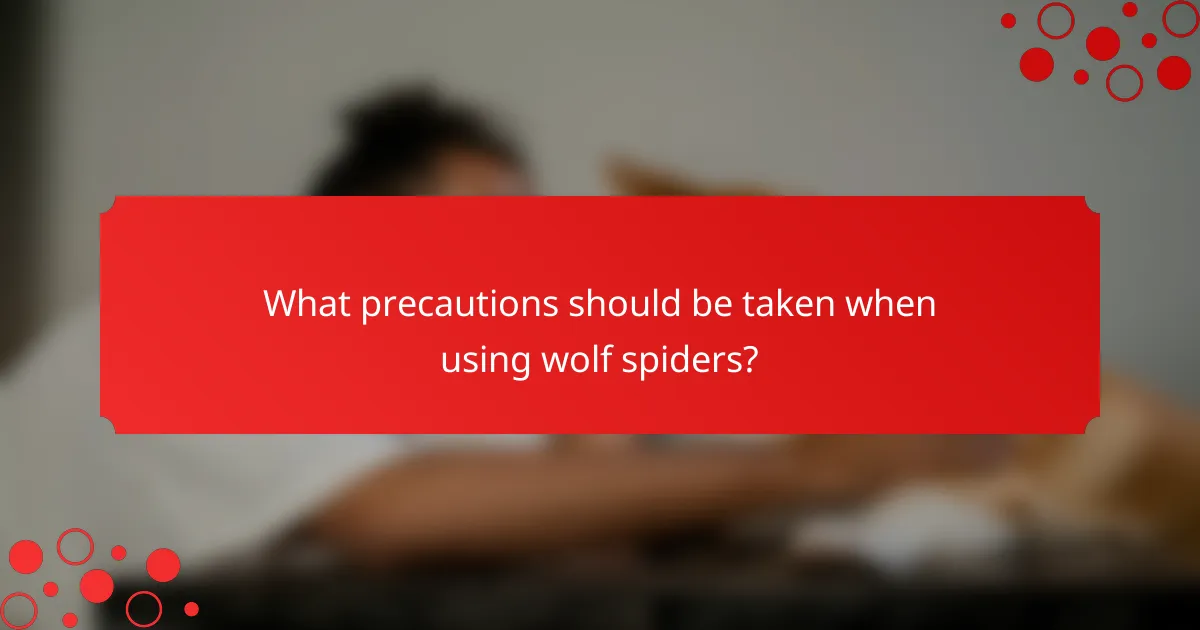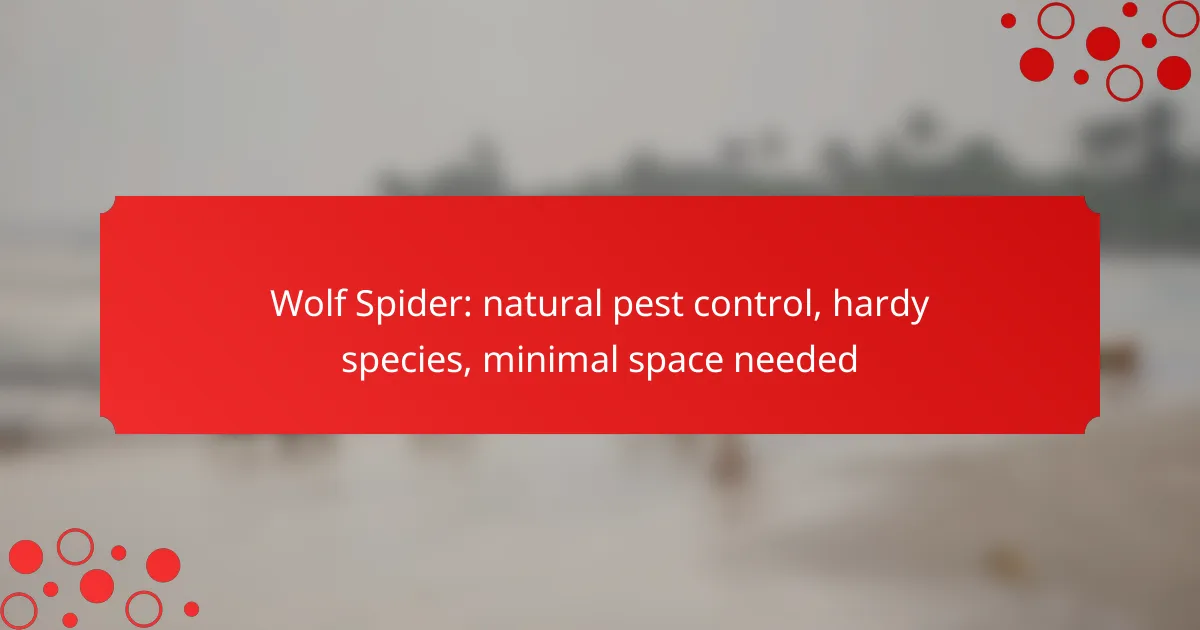Wolf spiders are remarkable natural pest controllers, actively hunting and preying on various insects to help maintain a balanced ecosystem without the use of chemical pesticides. Known for their hardiness and adaptability, these agile arachnids thrive in minimal spaces, making them suitable for gardens and other compact environments.

How do wolf spiders control pests in gardens?
Wolf spiders control pests in gardens by actively hunting and preying on various insects, making them effective natural pest controllers. Their presence can help maintain a balanced ecosystem by reducing pest populations without the need for chemical pesticides.
Effective natural pest control
Wolf spiders are highly effective natural pest controllers due to their hunting behavior. Unlike some spiders that build webs, wolf spiders actively roam and hunt their prey, which includes common garden pests such as aphids, caterpillars, and beetles. This predatory nature allows them to adapt to different environments and effectively manage pest populations.
By introducing wolf spiders into your garden, you can reduce reliance on chemical pesticides, promoting a healthier growing environment. Their ability to thrive in various conditions makes them a resilient choice for natural pest management.
Reduction of harmful insect populations
Wolf spiders significantly reduce harmful insect populations by consuming a wide range of pests. They can help control outbreaks of insects that may damage plants, ensuring healthier crops and gardens. For instance, a few wolf spiders can keep the population of aphids in check, preventing them from overwhelming your plants.
Monitoring the presence of wolf spiders can provide insight into the overall health of your garden ecosystem. Their activity often indicates a balanced environment where pest populations are kept under control.
Minimal impact on beneficial insects
One of the advantages of wolf spiders is their minimal impact on beneficial insects, such as pollinators and predatory insects that help control other pests. While they do hunt, their diet primarily targets harmful species, allowing beneficial insects to thrive. This balance is crucial for maintaining a healthy garden ecosystem.
To further protect beneficial insects, consider creating habitats that attract them, such as flowering plants or native vegetation. This approach can enhance the overall biodiversity of your garden while still benefiting from the pest control provided by wolf spiders.

What are the characteristics of wolf spiders?
Wolf spiders are robust and agile arachnids known for their excellent hunting skills and adaptability to various environments. They possess unique physical traits and behaviors that make them effective natural pest controllers.
Hardy and adaptable species
Wolf spiders thrive in diverse habitats, including forests, grasslands, and even urban areas. Their ability to adapt to different climates and conditions allows them to survive in both temperate and tropical regions.
These spiders are resilient, often enduring harsh weather and limited food sources. Their hardiness makes them a common sight in gardens and yards, where they help manage pest populations naturally.
Distinctive hunting behavior
Unlike many other spider species that build webs to catch prey, wolf spiders are active hunters. They rely on their keen eyesight and speed to stalk and ambush insects, making them efficient predators.
Wolf spiders often hunt alone, using their agility to chase down prey rather than waiting for it to come to them. This behavior not only helps control pest populations but also showcases their adaptability in various environments.
Physical features and coloration
Wolf spiders are typically medium to large in size, with body lengths ranging from about 1 to 4 cm. They have a robust build, long legs, and a distinctive eye arrangement that gives them excellent vision.
Coloration varies widely among species, often featuring shades of brown, gray, or tan, which provide effective camouflage in their natural surroundings. Some species may have patterns or markings that enhance their ability to blend into the environment, aiding in both hunting and avoiding predators.

How much space do wolf spiders need?
Wolf spiders require minimal space to thrive, often adapting well to small areas. They can live comfortably in environments as compact as a few square feet, making them ideal for various settings.
Small habitat requirements
Wolf spiders are versatile and can inhabit small spaces such as gardens, basements, and even inside homes. They do not require elaborate habitats; a simple area with some ground cover or debris is sufficient for them to hunt and breed.
Providing a few hiding spots, like rocks or logs, can enhance their living conditions without needing extensive space. This makes them easy to accommodate in both indoor and outdoor environments.
Suitable for urban gardens
Urban gardens are perfect for wolf spiders, as these areas often have a mix of vegetation and open spaces. They help control pests naturally, feeding on insects that can harm plants.
Incorporating wolf spiders into your garden can reduce the need for chemical pesticides, promoting a healthier ecosystem. Their presence can be encouraged by maintaining a diverse plant selection and minimizing disturbance.
Adaptability to various environments
Wolf spiders are highly adaptable and can thrive in diverse environments, from forests to grasslands and urban areas. They can adjust to different moisture levels and temperatures, making them resilient to changing conditions.
This adaptability allows them to find food and shelter in various settings, ensuring they remain effective predators regardless of their surroundings. Their ability to hunt efficiently in limited spaces further enhances their role in natural pest control.

What are the benefits of using wolf spiders for pest control?
Wolf spiders offer numerous benefits for pest control, including their effectiveness in managing insect populations and their adaptability to various environments. Utilizing these hardy species can lead to significant cost savings and a reduction in harmful chemicals in your home or garden.
Cost-effective pest management
Employing wolf spiders for pest control is a cost-effective strategy, as they require minimal investment compared to traditional pest management methods. These spiders are naturally occurring predators that can thrive in various habitats, making them a sustainable option for homeowners.
By allowing wolf spiders to inhabit your space, you can reduce the need for expensive pest control services or products. Their presence can lead to a noticeable decrease in common pests, such as flies and cockroaches, without incurring additional costs.
Environmentally friendly solution
Wolf spiders represent an environmentally friendly solution for pest control, as they do not rely on synthetic chemicals that can harm beneficial insects and the ecosystem. By promoting a natural balance, these spiders help maintain healthy environments in gardens and homes.
Encouraging wolf spiders to thrive in your area can enhance biodiversity and contribute to a healthier ecosystem. Their role as natural predators supports the food chain, ensuring that pest populations remain in check without disrupting the environment.
Reduction in chemical pesticide use
Utilizing wolf spiders can lead to a significant reduction in chemical pesticide use, which is beneficial for both human health and the environment. By relying on these spiders for pest management, you minimize exposure to potentially harmful substances.
Reducing chemical pesticides not only protects your family and pets but also helps preserve local wildlife. This approach aligns with growing trends towards organic gardening and sustainable living practices, making it a responsible choice for modern homeowners.

What precautions should be taken when using wolf spiders?
When using wolf spiders for natural pest control, it’s essential to take precautions to ensure safety and effectiveness. Proper identification, awareness of potential bites, and maintaining a balanced ecosystem are key factors to consider.
Identifying wolf spiders correctly
Correctly identifying wolf spiders is crucial to avoid confusion with other species that may be harmful. Wolf spiders are typically brown or gray with distinctive markings and are known for their robust bodies and long legs. They do not spin webs but hunt actively, which is a key characteristic to look for.
To confirm identification, observe their size, which usually ranges from 1 to 4 inches, and their eye arrangement, which features eight eyes in three rows. Using a field guide or reputable online resources can aid in accurate identification.
Avoiding bites and allergic reactions
While wolf spiders are generally not aggressive, they may bite if threatened. To minimize the risk of bites, avoid handling them and wear gloves when working in areas where they are present. If a bite occurs, clean the area thoroughly and monitor for any signs of allergic reactions, such as swelling or redness.
In case of severe reactions, seek medical attention promptly. Keeping a first-aid kit handy can be beneficial for treating minor bites or allergic responses quickly.
Maintaining a balanced ecosystem
To ensure that wolf spiders contribute positively to pest control, it’s important to maintain a balanced ecosystem. This includes providing a suitable habitat with adequate cover and food sources, such as other insects. Avoid using pesticides that could harm these beneficial spiders.
Encouraging biodiversity in your garden or home environment will help sustain the wolf spider population. Planting native vegetation and creating sheltered areas can promote a healthy ecosystem where wolf spiders can thrive and effectively manage pest populations.

How do wolf spiders compare to other pest control methods?
Wolf spiders offer a natural pest control solution that is effective and environmentally friendly, especially when compared to chemical alternatives. They are hardy creatures that require minimal space, making them suitable for various environments.
Comparison with chemical pesticides
Unlike chemical pesticides, which can pose health risks to humans and pets, wolf spiders are safe to have around. They hunt and consume a variety of pests, such as insects and small rodents, reducing the need for harmful chemicals.
Chemical pesticides often require careful application and adherence to safety regulations, which can be cumbersome for homeowners. In contrast, introducing wolf spiders into your garden or home can be a straightforward process, as they thrive in natural settings and do not need special handling.
While chemical pesticides may provide immediate results, their effects can diminish over time, leading to repeated applications. Wolf spiders, however, can establish a sustainable population that continues to control pests naturally without the need for ongoing intervention.



